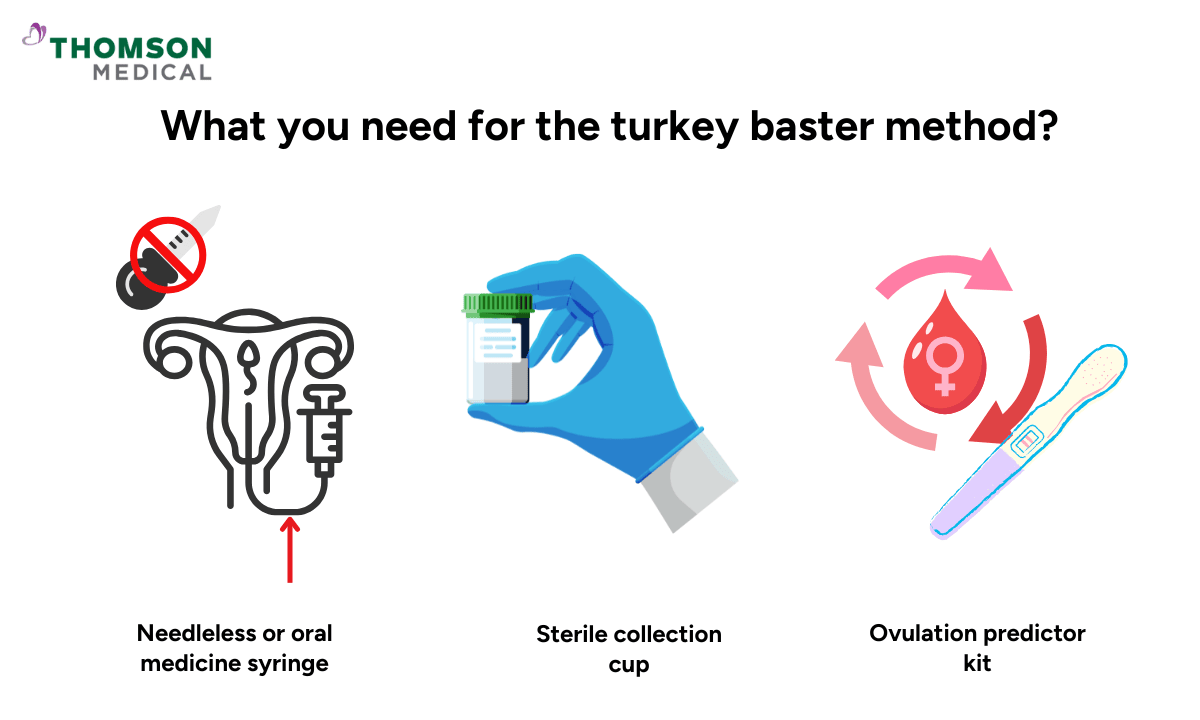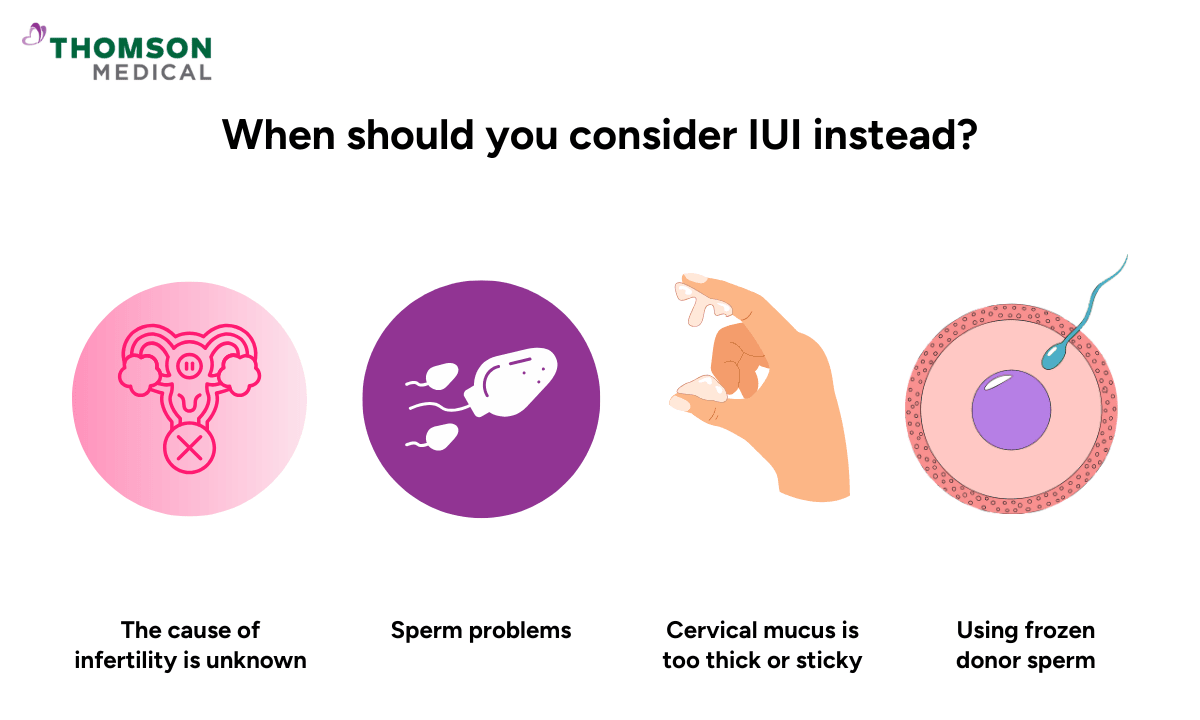When you and your partner are having difficulty conceiving, you may start exploring ways to help you get pregnant. You may have come across the “turkey baster method” and wonder how it compares to clinic-based options like IUI. While both approaches can help you achieve pregnancy, they work in different ways. Understanding these differences can help you decide which fertility treatment is right for you.
What is the turkey baster method?

The turkey baster method, also known as intracervical insemination (ICI), is a common term for at-home insemination, where sperm is deposited in the vagina near the cervix (the lower part of the womb). Although it’s called the “turkey baster” method, no actual turkey baster is used. Instead, a medical syringe is used to insert the sperm.
This approach is often chosen by single women and couples who prefer to try conceiving at home before seeking clinical treatment. The goal is to get the sperm as close to your cervix as possible when you're ovulating so it can travel to the fallopian tubes, where fertilisation happens.
To do this effectively, the tools that are commonly used are:
A needleless or oral medicine syringe (available in home insemination kits)
A sterile collection cup for sperm collection
An ovulation predictor kit to identify fertile days in your menstrual cycle
What is intrauterine insemination (IUI)?
Intrauterine insemination (IUI) is a type of fertility treatment done at a fertility clinic. During the procedure, your doctor uses a thin and flexible tube called a catheter to place specially prepared sperm directly into your uterus (womb). Prior to insemination, the sperm undergoes a washing process where it is cleaned and concentrated to select the healthiest sperm.
The procedure is performed around the time of ovulation. Sometimes, the doctor may prescribe fertility medication to stimulate ovulation. This method brings the sperm closer to the egg in the fallopian tubes, increasing the likelihood of fertilisation.
What are the differences between the turkey baster method and IUI?
While both methods aim to help sperm reach the egg more easily, they differ in how and where the process is done.
| Turkey baster method | IUI | |
|---|---|---|
Setting | At-home | Fertility clinic |
Device used | Needleless syringe | Medical-grade catheter |
Sperm preparation | Unwashed | Washed |
Sperm placement | In the vagina, near the cervix | Directly into womb |
Cost | Range from SGD 139 to 600 | Range from SGD 660 to 3000 |
Medical supervision | None | Fertility specialist |
If you’re unsure whether to try the turkey baster method at home or opt for IUI at a clinic, request an appointment with Thomson Medical. Our fertility specialists can assess your fertility conditions, explain the pros and cons of each option, and help you choose the safest and most effective approach for your journey.
Our fertility doctor in Singapore
Loading...
Can you get pregnant using the turkey baster method?
Yes, pregnancy is possible with the turkey baster method, and many couples have successfully conceived using this fertility treatment. Your chances of getting pregnant are higher when:
Sperm quality is healthy with good sperm motility
Ovulation timing is accurate
There are no underlying fertility issues
Is the turkey baster method effective for getting pregnant?
Yes, it can be effective when timing is right and sperm quality is healthy. However, the turkey baster method has lower success rates compared to IUI. Success rates are typically 10-15% per cycle, because the sperm is placed in the vagina and has to travel further to reach the egg. Additionally, the sperm is not washed or concentrated, so it still contains seminal fluid, which can slow sperm movement.
By contrast, IUI has slightly higher success rates at 15-20% per cycle because the sperm is placed directly into the uterus, closer to the egg.
Is the turkey baster method safe?
The turkey baster method can be safe if done carefully and with proper hygiene. It is recommended to:
Use clean and sterile equipment to reduce the risk of infection
Use fresh sperm and insert it soon after collection
Be gentle during insertion to avoid pain or injury
While risks are usually low, possible complications include infection, vaginal irritation, or placing thesperm not close enough to the cervix for the fertilisation to occur.
If you experience pain, irritation, or unusual discharge after using the turkey baster method, request an appointment with Thomson Medical. Our specialists can assess your symptoms and guide you on safe, at-home insemination techniques to minimise the risk of infection or injury.
When is the turkey baster method recommended?
If you’re wondering who the turkey baster method might be right for, this method is often recommended for:
Couples who want a low-cost, private conception method at home
Couples with unexplained infertility who want to try a simple approach first
Those with sexual abnormalities that makes intercourse difficult
Couples who prefer a natural approach before moving to clinical treatments
When should you consider IUI instead?

IUI is often recommended if you’ve been trying to become pregnant for several months or if medical reasons make it difficult to conceive naturally. You might consider IUI if:
The cause of infertility is unknown
Your partner has sperm problems, such as low sperm count, slow movement, or abnormal shape
Your cervical mucus is too thick or sticky, making it hard for sperm to survive
You are using frozen donor sperm
Fertility medicine is part of your treatment
like IVF treatment (in vitro fertilisation), where eggs are fertilised in a lab.
FAQ
How do I know which method is right for me?
If you are under 35, healthy, and trying to get pregnant with a partner or known donor, at-home insemination can be a good first step in your fertility journey. However, if you've been trying for several months without success or have known fertility issues, IUI might work better because it comes with medical help and timing that matches your ovulation.
Do people actually use turkey basters?
No. The name is just a figure of speech, and no actual turkey basters are used. Instead, oral syringes or needleless syringes are used, which are safe for vaginal use.
How does sperm quality affect success with each method?
Sperm quality is important for both methods. With IUI, the sperm is washed to remove dead cells and extra fluid, leaving only healthy sperm to reach the egg. At-home insemination uses unwashed sperm, which may not last as long inside the body and can slightly reduce the chances of fertilisation.
What is the most successful round of IUI?
Most people get pregnant within the first 3-4 IUI cycles, especially if fertility drugs are used. If pregnancy doesn't occur after about six cycles, your doctor may recommend other assisted reproductive technologies like IVF (in vitro fertilisation), where eggs are fertilised in a lab.
Can you use IUI sperm for at-home insemination?
Yes, you can safely use IUI-prepared (washed) sperm at-home for vaginal or intracervical insemination (ICI). Washing removes fluids that make the sperm safe to use inside the body. Women who are allergic to proteins in raw semen may even need washed sperm.
Most people use ICI-prepared (unwashed) sperm at home because it’s made for vaginal use and is usually cheaper. The important rule is to never put unwashed sperm directly into the uterus at home, as that can cause strong cramping or inflammation.
What helps sperm stay in the cervix?
Cervical mucus helps sperm survive and reach the egg. During ovulation, this mucus becomes thinner and less acidic, creating a friendlier environment for sperm to pass through. This is why timing intercourse or insemination during your fertile window is so important for conception.
The information provided is intended for general guidance only and should not be considered medical advice. For personalised recommendations and tailored advice based on your unique situations, please consult a specialist at Thomson Medical. Request an appointment with Thomson Medical today.
For more information, contact us:
Thomson Fertility
- Paragon: 6252 7766
Thomson Specialists (Women's Health)
Request an Appointment